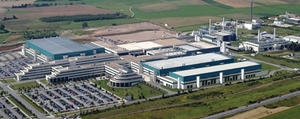Middle East turmoil: ramificationsArab Silicon Valley plan raise fears of CPU shortages, security risks
GlobalFoundries, originally part of U.S. No. 2 CPU manufacturer AMD, plans to spend $7 billion on a new chip fabrication facility in Abu Dhabi, the first in the Middle East; business and security experts say it is not a good idea to have a large segment of the U.S. and world economy depend on chips manufactured in an unstable, turmoil-prone region; the worry is not only that a hostile government coming to power would cut off computer components necessary for economnic activity and national security, but that foreign governments could build software or hardware into chips that could transmit confidential information

Artist's rendering of AMD facility in Dresden, Germany // Source: gigaom.com
The recent turmoil in Tunisia and Egypt has ramifications for the microchip segment of the U.S. economy as well. A chip company’s plan to open a manufacturing plant in Abu Dhabi has experts worried about the supply of essential computer processors. Should a war or a serious political disagreement arise, they say, a foreign power could stop or corrupt the flow of computer chips from its plants to the United States.
Intel Corporation announced some time ago that it plans to spend up to $8 billion on state-of-the-art plants in Oregon and Arizona, meaning a large number of central processing units (CPUs) — the brains behind every computer — would continue to be manufactured in the U.S. The company’s CEO, Paul Otellini, said the plants would “create 6,000 to 8,000 construction jobs, and about 1,000 permanent new jobs working in manufacturing.”
Fox News reports that Intel’s sole competitor, however, has its sights set on a new Silicon Valley — a Mideast country that experts say could take jobs from Americans and create serious security issues for the U.S.
“National security is based on innovation,” James P. Dougherty, a senior fellow at the Council on Foreign Relations and a member of the think tank’s Cyberconflict and Cybersecurity Initiative, told FoxNews.com. “We need to ensure that we keep control over some of those CPUs … and ensure that they’re made in the U.S.”
While companies in the United States have designed and built the CPUs for nearly every desktop and laptop computer for decades, it seems that America’s dominance may be waning.
More and more, computer chip manufacturing has already moved overseas. Now GlobalFoundries, originally part of No. 2 CPU manufacturer AMD, is looking to build a competing plant in Abu Dhabi, the first in the Middle East.
GlobalFoundries — born in 1979 when AMD opened its first manufacturing plant in Austin, Texas — is now owned by Advanced Technology Investment Company (ATIC), which is solely owned by the government of Abu Dhabi. Among ATIC’s goals: to develop a semiconductor industry in the United Arab Emirates.
That location is alarming to some industry analysts.
“One might worry that another country might someday turn hostile to us,” and cut off computer components necessary to national security, noted Jim Turley, editor-in-chief of the tech-industry bible The Microprocessor Report and the founder of the industry research firm Silicon Insider.
Dougherty and others worry that hostile governments could
